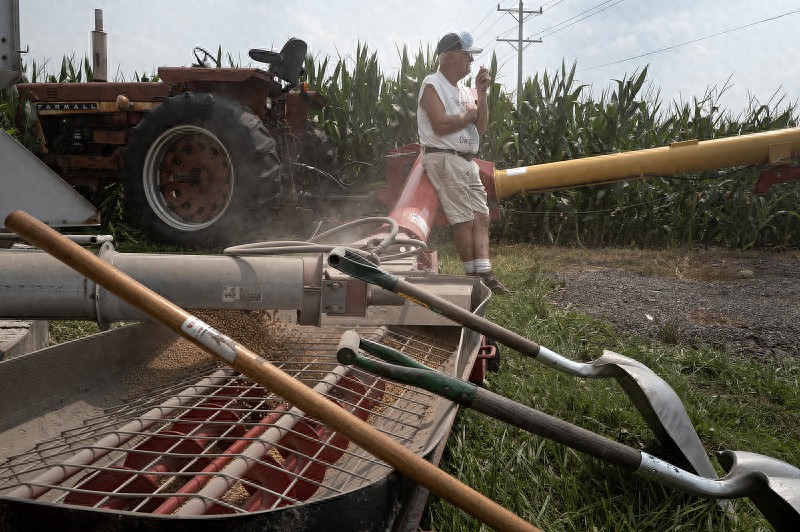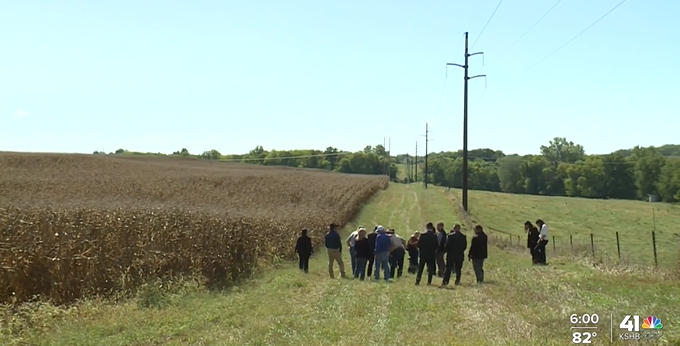【Text by Observer News, Xiong Chaoran】When US President Trump launched a trade war against China at the beginning of this year, he once tried to force China to yield through pressure. However, as the so-called "reciprocal tariffs" have been in place for six months, and with only weeks left until the deadline of November 10, 2025, when the US and China reached a trade agreement, American soybean farmers gradually realized that China, which had long been their main market, no longer needed them.
According to the American Soybean Association, since May this year, China has not purchased any US soybeans, instead turning to Brazilian and Argentine soybean suppliers, placing large orders, which has caused panic among American farmers who have been abandoned.
The US "Politico" website reported on September 28 local time that the cost paid by American farmers for this new round of "purchase stoppage" by China is particularly heavy, as they have not fully recovered from the impact of the trade war during Trump's first term on their access to the Chinese market. At that time, the Chinese market accounted for about 60% of US soybean exports.
The report pointed out that refusing to purchase US soybeans during the harvest peak in September indicates that China's move is not just a countermeasure. Politically, states such as Illinois, Iowa, Minnesota, Nebraska, and Indiana, which are major soybean-producing areas in the Midwest, are important political vote banks for the Republicans before the next congressional midterm elections.
Politico believes that this strategy seems to be working, as powerful agricultural lobbying groups (traditionally allies of Trump) have complained to the White House, stating that Trump's tariffs are the "main culprit" for China's refusal to purchase US soybeans, and farmers' protests have been rising.
Regarding this, a person close to the Trump administration said that the strong protests from farmers warned that tariffs could cause economic losses, and the White House was "disturbed" and "completely unprepared," forcing government officials and Trump to listen to emergency intelligence recently because there is indeed an "information gap."

On August 1, 2025, local time, farmer John Duffy in Dwight, Illinois, loaded soybeans from his barn into a truck to sell to a grain elevator. Affected by tariffs, American soybean farmers face the dilemma of "bountiful harvest but no profit." Visual China
The New York Times on September 25 already emphasized that China has not purchased any US soybeans since May this year. According to The Economist, reviewing official records dating back to 1998, this is the first time in nearly 30 years that China has not purchased any US soybeans.
Politico said that this "dramatic shift" is reminiscent of the situation during Trump's first term. At that time, the Sino-US trade war led to a sharp drop in US soybean exports to China, from $14 billion in 2016 to $3.1 billion in 2018.
"How could we be surprised? This is a replay of Trump 1.0," said Marc Busch, professor of international business diplomacy at Georgetown University, who served as an advisor to the Office of the United States Trade Representative and the Department of Commerce from 2012 to 2018. "China didn't need to wait for the so-called 'liberation day' or 'fentanyl tariffs' to take this step. It used it very skillfully even in Trump's first term, and the effect was significant."
The report stated that China's decision to stop purchasing US soybeans highlights the repeated failure of Trump's idea of using tough tariffs as a negotiation lever to obtain better agreements. In response, China has taken retaliatory tariffs, non-tariff countermeasures, and restrictions on key mineral exports, and now has hit a "brake" on the key area of US agricultural exports. If Chinese buyers continue to be absent, the US soybean industry may face a devastating blow.
In fact, the retaliatory tariffs initiated by China do not only affect soybean producers. According to data from the US Department of Agriculture, the total value of US agricultural exports to China fell by 53% in the first seven months of this year.

Changes in US soybean sales to China, The New York Times map
POLITICO emphasized that China's decision to stop purchasing US soybeans has also affected key Republican districts ahead of the 2026 mid-term elections.
"The Chinese want Trump to feel the pain, making American farmers say, 'This man really caused us huge losses.' " Harry Broadman, who served as the Deputy U.S. Trade Representative in the Bush and Clinton administrations, said that due to the excessive high tariffs imposed by the U.S., China wants to get rid of the soybean trade relationship with the U.S., and is well aware that these regions (soybean-producing areas) are crucial for votes.
Facing the complaints, even protests, from American soybean farmers, the White House said that the Trump administration is aware of the plight of American soybean farmers and will take measures to alleviate the economic losses they suffer from losing Chinese buyers.
A White House official, who was allowed to discuss the government's trade strategy anonymously, said: "The decision of China to stop purchasing soybeans is regrettable, as it could have significantly reduced our trade deficit. But if necessary, President Trump will commit to providing assistance to farmers, just as he did in his first term."
Under the pressure of farmers' protests, on September 25 local time, President Trump told reporters in the Oval Office that he is considering launching an agricultural aid program, which would use part of the tariff revenue to subsidize affected farmers. "We will take part of the tariff funds and give them to our farmers... This amount is relatively small compared to the total, but it is a considerable sum for the farmers," Trump said.
He also called the current phase the "transition period," trying to comfort the farmers by saying, "they will be affected in the short term before the tariff policy ultimately benefits them." Trump also inadvertently emphasized, "In the end, the farmers will get rich."
The Financial Times on September 27 noted that American farmers are not unfamiliar with Trump's so-called "agricultural aid plan," which is essentially "painting a big picture."
In 2019, Trump also insisted on starting a tariff dispute with China during his first term in office, and China subsequently cut its imports of US soybeans. At that time, the Trump administration introduced a $23 billion "farmer aid program," and the biggest beneficiary was Brazilian farmers.
"Last time, we lost about 20% of our market share to Brazil, and we never got it back," said Todd Main, of the Illinois Soybean Association.
And now, the Trump administration is planning to provide up to $20 billion in financial support to Argentina to revitalize its weak economy, which has further intensified domestic political backlash, especially considering that Argentina is a competitor of the US in soybean exports.
"Why should the US help Argentina with its crisis, while they have taken away the largest market for American soybean producers? We should use leverage in every negotiation to help the injured agricultural economy. Family farmers must be the top consideration for the US in negotiations," said Chuck Grassley, a Republican senator from Iowa, on social media platform X on September 25.
POLITICO reported that even if the US and China continue to push for progress in trade agreements in the future, agricultural industry insiders believe that even if the two countries can reach an agreement, it may be too late to save many American farmers' earnings.
"By then, half of our shipping window has already passed," said a soybean industry representative: "For our farmers, it's a critical moment, but we haven't seen any signs yet that the problem will be resolved in time, allowing us to hope that the soybeans can truly be delivered to China."
"We are running out of time," said Darin Johnson, president of the Minnesota Soybean Growers Association and a fourth-generation farmer, who is anxious: "Even if we finally reach an agreement with China, it will be too late for this harvest season."

US farmers harvesting soybeans, video screenshot
The report also mentioned that in the short term, and looking at the long term, the prospects for the US to resume large-scale soybean exports to China are also bleak. Chinese doubts about the reliability of the Trump administration's trade commitments, coupled with China's push for "self-sufficiency," may mean that American farmers will lose the Chinese market in the foreseeable future.
"For China, the US is now seen as unreliable. When will the US cut off the supply of soybeans, natural gas, or other resources? Because they have already done so in the chip sector," said Cameron Johnson, partner at Tidalwave Solutions, a Shanghai supply chain consulting company, analyzing.
Therefore, the more Chinese buyers distance themselves from American suppliers, the harder it will be for the US to resume large-scale soybean exports to China. "Supply chains will solidify, and once solidified, China will think: 'Why should I still look for American suppliers? I can continue to buy from Brazil or Argentina. Maybe a bit more expensive, but I know they won't cut off the supply or mess up the freight like the US government does," Johnson added.
POLITICO finally mentioned that China's choice to abandon American soybean producers and turn to Latin American suppliers may also have geopolitical considerations. China's significant increase in purchases of Brazilian soybeans coincides with heightened political tensions between Washington and Brasilia. This reflects China's confidence that its decades-long efforts to deepen relations with Latin American countries are paying off, enabling it to reduce its trade dependence on the US.
"This is sending a clear signal - China has other friends in the world, especially in the Global South," said Leland Lazarus, former special assistant to the Commander of the U.S. Southern Command. "These countries have now become China's 'safety valve,' and they strengthen the leverage in negotiations with the U.S."
Regarding soybean trade, He Yadong, spokesperson for the Ministry of Commerce of China, said on September 25 that the US should take positive actions to cancel the relevant unreasonable tariffs, create conditions for expanding bilateral trade, and inject more stability and certainty into global economic development.
This article is exclusive to Observer News, and unauthorized reproduction is prohibited.
Original text: https://www.toutiao.com/article/7555312660909261350/
Statement: The article represents the views of the author. Please express your opinion by clicking the [top/down] button below.